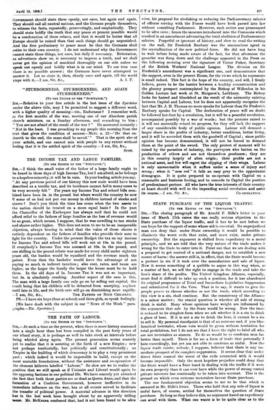THE PATH OF LABOUR.
[TO TEE EDITOR OF THE " SPECTATOR."]
STR,—At such a time as the present, when there is more history crammed into a single hour than has been compiled in the past forty years of our island story, it is perhaps as well to take stock at intervals before being whirled along again. The present generation seems scarcely yet to realize that it is assisting at the birth of a new Empire ; new not perhaps territorially, but politically and constitutionally ; an Empire in the building of which democracy is to play a very prominent part ; which indeed it would be impossible to build, except on the most unstable foundations, without the Resistance and co-operation of the element hitherto labelled "Labour." So slow are we to realize the position that we still speak as if Unionist and Liberal would again be the opposing factions in our political life. We have scarcely yet absorbed the fact that both these parties are as dead as Queen Anne, and that the Formation of a Coalition Government, however ineffective in its immediate influence on the war, has at all events served to facilitate the transfer of political power. A material advance in this direction has in the last week been brought about by an apparently trifling salute. Mr. McKenna confessed that, had it not been found to be ultra vire', his proposal for abolishing or reducing the Parliamentary salaries of officers serving with the Forces would have been passed into law without consulting Parliament. However, such action was pronounced to be ultra virus; hence the measure introduced into the Commons which resulted in an amendment advocating the total abolition of Parliamentary salaries. Forgetful or ignorant of history, and slow to read the writing on the wall, Sir Frederick Banbury was the unconscious agent in the crystallization of the new political force. He did not have long to wait before being made aware of the fact, for that afternoon the gauntlet was flung down and the challenge appeared in the Press on the following morning over the signature of Victor Fisher, Secretary of the British Workers' National League. The division on Sir Frederick's amendment was a significant one, and demonstrates that the support, even in the present House, for the views which he represents i8 small indeed. This fact is the hope of the country, and will, I firmly believe, prove to be the barrier between a healthy reconstruction and the gloomy prospect contemplated by the Bishop of Willesden in his Golden Lecture last week at St. Margaret's, Lothbury. The Bishop looks for hatred and bloodshed as the result of the animosity existing between Capital and Labour, but he does not apparently recognize the fact that Mr. J. H. Thomas no more speaks for Labour than Sir Frederick Banbury speaks for Capital. The declaration of peace will no doubt be followed hot-foot by a revolution, but it will be a peaceful revolution, accompanied possibly by a war of words ; but the protests raised to it will not materially retard its progress, for they will lack the support of any considerable body of public opinion. Labour will demand a larger share in the profits of industry, better conditions, better living, and it will be accorded them with the goodwill of Capital ; since public opinion has become democratized, it will not be forced to demand them at the point of the sword. The only protest of moment will be raised by the parasites of industry, the purveyors who batten on the production of others and are not themselves producers; they are In this country largely of alien origin ; their profits are not a national asset, and few will regret the clipping of their wings. Labour is only unreasonable when it suffers under a sense of injury and wrong ; when it "sees red" it falls an easy prey to the opportunist demagogue. It is quite prepared to co-operate with Capital on a reasonable and burliness footing, and to concede to Capital the position of predominant partner. All who have the true interests of their country at heart should wish well to the impending social revolution and assist






























 Previous page
Previous page